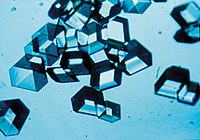
Evaluating the Cytometric Detection and Enumeration of the Wine Bacterium, Oenococcus oeni
Sign Up to like & getrecommendations! Published in 2020 at "Cytometry Part A"
DOI: 10.1002/cyto.a.24258
Abstract: Flow cytometry is a high‐throughput tool for determining microbial abundance in a range of medical, environmental, and food‐related samples. For wine, determining the abundance of Saccharomyces cerevisiae is well‐defined and reliable. However, for the most… read more here.
Keywords: oenococcus oeni; wine bacterium; flow cytometry; cytometry ... See more keywords

Heterologous expression of the puuE from Oenococcus oeni SD‐2a in Lactobacillus plantarum WCFS1 improves ethanol tolerance
Sign Up to like & getrecommendations! Published in 2019 at "Journal of Basic Microbiology"
DOI: 10.1002/jobm.201900339
Abstract: Oenococcus oeni is the main bacteria extensively used in malolactic fermentation due to its high tolerance against stress factors in wine production. Among these, ethanol is one of the main challenges to O. oeni, and… read more here.
Keywords: lactobacillus plantarum; ethanol tolerance; tolerance; wcfs1 ... See more keywords

Characterization of natural Oenococcus oeni strains for Montepulciano d’Abruzzo organic wine production
Sign Up to like & getrecommendations! Published in 2020 at "European Food Research and Technology"
DOI: 10.1007/s00217-020-03466-3
Abstract: Montepulciano d'Abruzzo is a red wine grape variety of Vitis vinifera L., grown in Central Italy. It is mainly identified with Abruzzo region, where it currently accounts for around 50% of the regional vineyard. Malolactic… read more here.
Keywords: organic wine; wine; abruzzo organic; oenococcus oeni ... See more keywords

Exploring the diversity of bacteriophage specific to Oenococcus oeni and Lactobacillus spp and their role in wine production.
Sign Up to like & getrecommendations! Published in 2021 at "Applied microbiology and biotechnology"
DOI: 10.1007/s00253-021-11509-2
Abstract: The widespread existence of bacteriophage has been of great interest to the biological research community and ongoing investigations continue to explore their diversity and role. They have also attracted attention and in-depth research in connection… read more here.
Keywords: diversity; wine; bacteriophage; oenococcus oeni ... See more keywords

Heterologous expression of Oenococcus oeni sHSP20 confers temperature stress tolerance in Escherichia coli
Sign Up to like & getrecommendations! Published in 2018 at "Cell Stress and Chaperones"
DOI: 10.1007/s12192-018-0874-5
Abstract: AbstractSmall heat shock proteins (sHSPs) are heat shock proteins sized 12–43 kDa that can protect proteins from denaturation, particularly under high temperature; sHSPs thus increase the heat tolerance capability of an organisms enabling survival in adverse… read more here.
Keywords: escherichia coli; tolerance; oenococcus oeni; expression ... See more keywords

Effect of exogenous proline on the ethanolic tolerance and malolactic performance of Oenococcus oeni
Sign Up to like & getrecommendations! Published in 2020 at "Journal of Food Science and Technology"
DOI: 10.1007/s13197-020-04426-1
Abstract: The use of malolactic starter cultures, often offer no guarantee of microbiological success due to the chemical and physical factors (pH, ethanol, SO2, nutrient availability) that occur during the winemaking process. This study was born… read more here.
Keywords: tolerance malolactic; effect exogenous; oenococcus oeni; performance ... See more keywords

Integrative multiomics analysis of the acid stress response of Oenococcus oeni mutants at different growth stages.
Sign Up to like & getrecommendations! Published in 2022 at "Food microbiology"
DOI: 10.1016/j.fm.2021.103905
Abstract: BACKGROUND Acid stress is one of the most important environmental stresses that adversely affect the growth of lactic acid bacteria (LAB), such as Oenococcus oeni which was isolated from grape-berries and mainly used in wine… read more here.
Keywords: oenococcus oeni; oeni mutants; different growth; acid stress ... See more keywords

Identification of variable genomic regions related to stress response in Oenococcus oeni.
Sign Up to like & getrecommendations! Published in 2017 at "Food research international"
DOI: 10.1016/j.foodres.2017.09.039
Abstract: The lactic acid bacterium Oenococcus oeni is the most important species involved in malolactic fermentation due to its capability to survive in presence of ethanol and in the acidic environment of wine. In order to… read more here.
Keywords: oenococcus oeni; stress; oeni strains; related stress ... See more keywords

Genetic and transcriptional study of glutathione metabolism in Oenococcus oeni.
Sign Up to like & getrecommendations! Published in 2017 at "International journal of food microbiology"
DOI: 10.1016/j.ijfoodmicro.2016.11.013
Abstract: Although Oenococcus oeni is the main species that is responsible for malolactic fermentation (MLF), harsh wine conditions can limit its performance. Although several mechanisms underlying the response to stress have been studied in this species,… read more here.
Keywords: study; gsh; oenococcus oeni; ethanol ... See more keywords

The production of preconditioned freeze-dried Oenococcus oeni primes its metabolism to withstand environmental stresses encountered upon inoculation into wine.
Sign Up to like & getrecommendations! Published in 2022 at "International journal of food microbiology"
DOI: 10.1016/j.ijfoodmicro.2022.109617
Abstract: Oenococcus oeni is the most resistant lactic acid bacteria species to the environmental stresses encountered in wine, particularly the acidity, presence of ethanol and phenolic compounds. Indigenous strains develop spontaneously following the yeast-driven alcoholic fermentation… read more here.
Keywords: freeze; environmental stresses; oenococcus oeni; stresses encountered ... See more keywords

Presence of Oenococcus oeni and other lactic acid bacteria in grapes and wines from Priorat (Catalonia, Spain)
Sign Up to like & getrecommendations! Published in 2017 at "Lwt - Food Science and Technology"
DOI: 10.1016/j.lwt.2017.03.054
Abstract: Oenococcus oeni, the lactic acid bacterium (LAB) mainly responsible for malolactic fermentation, has been repeatedly isolated from wines, but hardly ever from grapes. In this study, a large survey of autochthonous LAB from the Catalan… read more here.
Keywords: presence oenococcus; oenococcus; oeni lactic; oenococcus oeni ... See more keywords